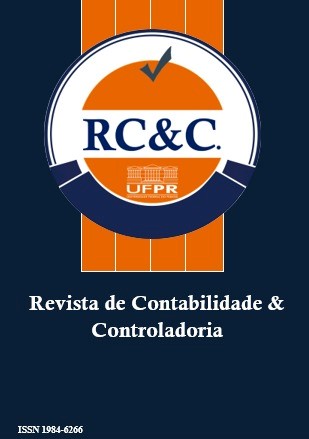Planejamento e Orçamento Público: uma revisão bibliométrica internacional
DOI:
https://doi.org/10.5380/rcc.v16i2.90048Palavras-chave:
Planejamento Público, Orçamento Público, Análise bibliométrica, Análise conceitual.Resumo
Na intersecção entre a teoria e a prática, o planejamento e orçamento público emergem como pilares fundamentais para a gestão eficaz e transparente nas organizações públicas. Reconhecendo a grande importância desses elementos na administração financeira e no desenvolvimento socioeconômico, este estudo visa aprofundar a compreensão sobre a evolução da literatura científica internacional nessa área, por meio de uma análise bibliométrica e conceitual meticulosa, realizada no período de 1962 a 2021, na base de dados Web of Science. No total, a amostra contemplou 201 artigos científicos. Na análise bibliométrica, os resultados indicam um aumento significativo das publicações no período de 2018 a 2020. Os periódicos dos Estados Unidos apresentaram a maior concentração de publicações globais. De forma geral, observou-se que poucos autores se dedicam essencialmente ao tema planejamento e orçamento público, e a maioria dos estudos concentra-se em publicações individuais. Em relação às principais áreas que abordaram o tema planejamento e orçamento público, destaca-se as temáticas recentes de políticas fiscais, orçamento participativo, governos locais e processo de planejamento orçamentário. No que tange à análise conceitual, identificou-se como temas centrais de pesquisa a 'gestão orçamentária' (budgeting), 'planejamento estratégico' (strategic planning), 'administração pública' (public administration), 'gestão pública' (public management) e 'finanças públicas' (public finance). Esses tópicos são fundamentais para entender as abordagens predominantes e as preocupações essenciais no campo da contabilidade pública, com percepções valiosas tanto para o desenvolvimento teórico quanto para as aplicações práticas na gestão pública. Este estudo contribui significativamente para a literatura acadêmica ao mapear as tendências atuais e históricas e oferece orientações práticas para a contabilidade e gestão pública, transparência, eficiência e responsabilidade nas organizações públicas.
Referências
Abernethy, M. A., & Brownell, P. (1999). The role of budgets in organizations facing strategic change: an exploratory study. Accounting, organizations and society, 24(3), 189-204.
Abu-Doleh, J., & Weir, D. (2007). Dimensions of performance appraisal systems in Jordanian private and public organizations. The International Journal of Human Resource Management, 18(1), 75-84.
Ahrens, T., & Ferry, L. (2018). Institutional entrepreneurship, practice memory, and cultural memory: Choice and creativity in the pursuit of endogenous change of local authority budgeting. Management Accounting Research, 38, 12-21. [10].
Araújo, C. A. (2006). Bibliometria: evolução histórica e questões atuais. Em questão, 12(1), 11-32.
Araújo, R. F., & Alvarenga, L. (2011). A bibliometria na pesquisa científica da pós-graduação brasileira de 1987 a 2007. Encontros Bibli: Revista Eletrônica de Biblioteconomia e Ciência da Informação, 16(31), 51-70.
Behn, R. D. (2001). Rethinking democratic accountability. Brookings Inst Press.
Burns, J., & Scapens, R. W. (2000). Conceptualizing management accounting change: an institutional framework. Management accounting research, 11(1), 3-25.
Cardoso, R. L., Mendonça Neto, O. R., Riccio, E. L., & Sakata, M. C. G. (2005). Pesquisa científica em contabilidade entre 1990 e 2003. Revista de Administração de Empresas, 45(2), 34-45.
Cohen, s., & Karatzimas, S. (2014). Reporting performance information in the public sector: the moral behind the (non) application of program budgeting in Greece. International Review of Administrative Sciences, 80(3), 619-636. [16]
Conway, E., Fu, N., Monks, K., Alfes, K., & Bailey, C. (2016). Demands or resources? The relationship between HR practices, employee engagement, and emotional exhaustion within a hybrid model of employment relations. Human Resource Management, 55(5), 901-917.
Covaleski, M., Evans III, J. H., Luft, J., & Shields, M. D. (2006). Budgeting research: three theoretical perspectives and criteria for selective integration. Handbooks of management accounting research, 2, 587-624.
Covaleski, M. A., Dirsmith, M. W., & Weiss, J. M. (2013). The social construction, challenge and transformation of a budgetary regime: The endogenization of welfare regulation by institutional entrepreneurs. Accounting, Organizations and Society, 38(5), 333-364.
Ferreira, I. G. S., & et al. (2019). Mecanismos e modelos para atenção ao formalismo na condução do orçamento e das finanças públicas. Revista Valore, 4, 331-340.
Guedes, V. L., & Borschiver, S. (2005). Bibliometria: uma ferramenta estatística para a gestão da informação e do conhecimento, em sistemas de informação, de comunicação e de avaliação científica e tecnológica. Encontro Nacional de Ciência da Informação, 6(1), 18.
Guesser, P. C. L., Petri, S. M., & Lavarda, C. E. F. (2020). Orçamento: Perspectivas Teóricas das Pesquisas Científicas Internacionais. Revista Mineira de Contabilidade, 21(1), 9-22.
Kargol-Wasiluk, A., & Wildowicz-Giegiel, A. (2018). The quality of public finance in the light of fiscal governance concept: implications for the European Union countries. Equilibrium. Quarterly Journal of Economics and Economic Policy, 13(3), 411-426.
Lunkes, R. J., Feliu, V. M. R., & Rosa, F. S. (2011). Pesquisa sobre o orçamento na Espanha: um estudo bibliometrico das publicações em contabilidade. Revista Universo Contábil, 7(3), 112-132.
Machado, C. Jr., Souza, M., Parisotto, I., & Palmisano, A. (2016). As Leis da Bibliometria em Diferentes Bases de Dados Científicos. Revista de Ciências da Administração, 1(1) 111-123.
Johansson, T., & Siverbo, S. (2014). The appropriateness of tight budget control in public sector organizations facing budget turbulence. Management Accounting Research, 25(4), 271-283.
Macias-Chapula, C. A. (1998). O papel da informetria e da cienciometria e sua perspectiva nacional e internacional. Ciência da informação, 27(2), nd-nd.
Mutiganda, J. C. (2016). How do politicians shape and use budgets to govern public sector organizations? A position-practice approach. Public Money & Management, 36(7), 491-498.
Oliveira, S. C., Barbosa, E. S., Resende, I. C., Silva, R. P. & Albuquerque, L. S. (2013). Bibliometria em Artigos de Contabilidade Aplicada ao Setor Público. Anais do Congresso Brasileiro de Custos, Uberlândia, MG, Brasil, 20.
Rezende, D. A., & Castor, B. V. J. (2006). Planejamento estratégico municipal: empreendedorismo participativo nas cidades, prefeituras e organizações públicas. Rio de Janeiro: Brasport.
Rodrigues, S. P., de Souza, M. C., Franco, M. L., de Souza Pompermayer, R., Almeida, I. C., Barros, G. F., ... & Novais, A. F. O. (2020). A qualidade das finanças públicas: análises bibliométrica e textual de publicações da base de dados Web of Science. Pesquisa, Sociedade e Desenvolvimento, 9(11), e239119617-e239119617.
Rubin, I. S. (2015). Public budgeting: Policy, process and politics. Routledge.
Rus, M. I. (2020). The impact of local public finances on a community. Fiat Iustitia, 1, 181188.
Sanches, P. M., Nossa, V., & de Almeida Lopes, V. (2005). A influência do plano plurianual nos indicadores de execução: um estudo exploratório na Prefeitura de Vitória. REGE Revista de Gestão, 12(3), 29-45.
Severino, A. J. (2002). Metodologia do trabalho cientifico. (22a ed.), São Paulo: Cortez.
Schick, A. (2002). The Role of Fiscal Rules in Budgeting. OECD Journal on Budgeting, 2(3), 7-34.
Tanwir, M., & Chaudhry, A. (2016). Reforming a broken system: a new performance evaluation system for Pakistan civil servants. Pakistan Development Review, 55(1), 49.
Downloads
Publicado
Como Citar
Edição
Seção
Licença
Copyright (c) 2024 RC&C. Revista de Contabilidade e Controladoria

Este trabalho está licenciado sob uma licença Creative Commons Attribution-NonCommercial-NoDerivatives 4.0 International License.
Os trabalhos publicados na RC&C. Revista de Contabilidade e Controladoria estão sujeitos aos seguintes termos:
1.1. A RC&C. Revista Contabilidade & Controladoria, através do Programa de Pós-Graduação em Contabilidade do Departamento de Contabilidade - Setor de Ciências Sociais Aplicadas - Universidade Federal do Paraná, retém os direitos de propriedade (direitos autorais) dos trabalhos publicados e incentiva e permite sua reutilização sob a Licença Creative Commons 4.0 de CC Attribution-NonCommercial-ShareAlike 4.0, para que possam ser copiados, utilizados, disseminados, transmitidos e exibidos publicamente, desde que:
1.1.a. A autoria e a fonte original da publicação (periódico, editora, URL e DOI do trabalho) sejam citadas.
1.1.b. Não sejam utilizados para fins comerciais ou onerosos.
1.1.c. A existência e as especificações desta licença de uso são mencionadas.
1.2. A publicação atribuirá a cada artigo um Identificador de Objeto Digital (DOI).









